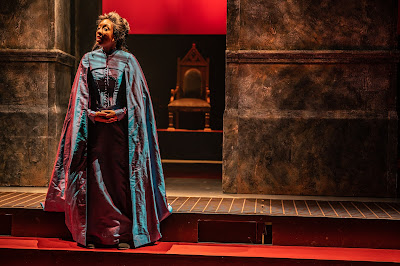Reviewed by James Karas
I can think of many reasons for seeing Singin’ in the Rain at The Princes of Wales Theatre in Toronto (or anywhere for that matter) and I can’t come up with a single excuse for not seeing it. The movie has been around for 70 years and most people have seen it or at least have heard of it. The scene with Gene Kelly dancing in the rain and waving an umbrella is legendary and unforgettable.
Can something so famous and iconic be turned into a stage musical? The answer is a resounding yes.
Sing’s In The Rain takes place at a pivotal time in the late 1920s when the movies became “talking films.” Hollywood poohbahs scoffed at the idea of anything being able to dislodge the great silent features and predicted that the talkies were just a passing fad. That’s funny. Screenwriters Betty Comden and Adolph Green took advantage of that attitude when they wrote the screenplay for the 1952 movie. They provided a marvellous script of romance, satire and delightful humour that has worn as well on stage as it did on the screen.
Further magic was provided by the memorable songs of Nacio Herb Brown and the legendary Arthur Freed. And, of course, dancing.
The stage adaptation has everything you would expect and deserve from a first-class musical. It has a variety of songs from the romantic, to the satirical to the hilarious and simply wonderful, the dancing that is done superbly with rain and water on the stage floor and Sam Lips as Don Lockwood dancing and splashing water on the front rows of the audience. Charlotte Gooch is a beautiful Kathy Selden, the would-be Ethel Barrymore-type of actress who is hired to dub for the dippy Lina Lamont and becomes a star. She gets Lockwood of course. Fay Tozer plays the ridiculous Lina who looks fine in silents but has a squeaky voice that is hilarious in a talkie.
Alistair Crosswell gets the juicy role of Cosmo Brown, the musician who sings and dances “Make ’em Laugh” one of the most famous routines in musical history. Croswell has a fine comic talent as well and delivers one of the best performances of the evening. Michael Brandon as the studio head R.F. Simpson was very funny.
The musical has a large and excellent cast for the many roles and ensemble pieces. Danc
ing is a significant part of the evening and again an outstanding performance is at hand.
The singing was generally very good and songs like “Good Morning”, “Moses Supposes,” “You Stepped Out of a Dream,” “Beautiful Girl” and others cover the gamut of romance, vigorous singing, satire and just plain entertainment. There were some high notes that could not be reached and a few flat notes that sneaked in but the show was produced with such vigour and elan you did not notice whatever minor glitches that may have surfaced.
Andrew Wright’s choreography was vigorous and beautiful. The set and costumes by Simon Higlett were perfect for the show and with the lighting design of Grant Walsh provided the glitz that we imagine that Hollywood was like.
Director Jonathan
Church kept the huge enterprise moving with precision, excellent pacing and
gave us a wonderful, funny show and a great night at the theatre.
__________
Singin’ in the Rain by Betty
Comden and Adolph Green (screenplay), Nacio Herb Brown and Arthur Frees (songs),
based on the MGM film, opened on September 29022 and will play until October 23,
2022, at the Princess of
Wales Theatre, 300 King St. West,
James Karas is the Senior Eitor - Culture of The Greek Press, Toronto

















